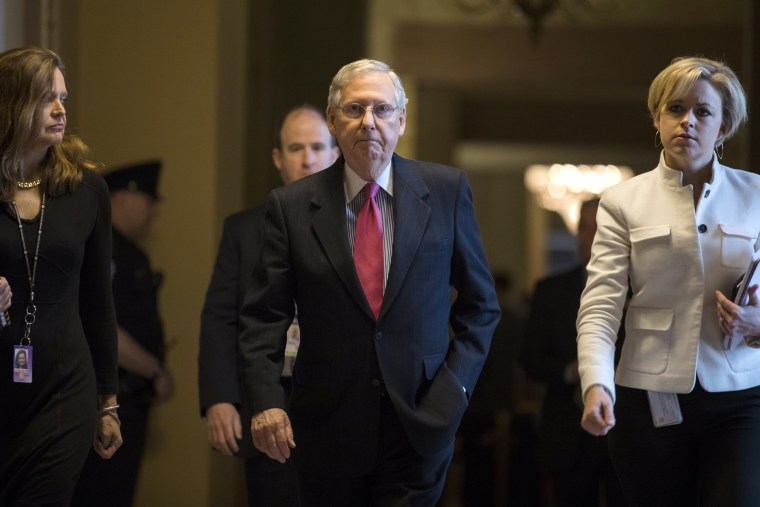WASHINGTON — After weeks of meetings, Senate Republicans attempting to hash out a way forward on a bill to repeal and replace the Affordable Care Act are no closer to agreeing how the country’s health care system should operate.
One decision has been made, however: Over the upcoming 11-day recess, staff of the key committees have been tasked with beginning the process of putting pen to paper and crafting health care legislation.
It's a step forward but it doesn’t mean Republicans have reached any consensus yet.
“I think we’re building consensus,” said Sen. John Cornyn, the second ranking Republican in the Senate leaving a meeting on health care, offering the most optimistic assessment of where Republican talks stand.
Senate Majority Leader Mitch McConnell was less optimistic. He admitted this week that Republicans are not close to obtaining the necessary 50 votes to pass a health care bill.
“I don't know how we get to 50 [votes] at the moment. But that's the goal," he told Reuters.
Republican senators have been tight-lipped about what takes place behind the closed doors of their twice-weekly meetings and multiple lunches discussing the issue. But they've been open about the difficult of the task.
“Health care’s hard. No surprise to us. Early a little of a surprise to the president who wouldn’t have thought health care could be so complicated. It’s really complicated,” Sen. Roy Blunt said.
GOP leaders are facing the same challenge that initially stymied House Republicans: crafting legislation that gets enough support from members of their own party. Democrats are not involved in drafting the Senate bill, and were unanimously opposed to the bill the House passed earlier this month.
After three weeks of meetings, senators have not reached an agreement on how to approach a variety of issues, like the scope of Medicaid, protections for people with pre-existing conditions and other protections provided to consumers in the individual insurance market.
“One of the things that’s most encouraging is the members of the working group are meeting in good faith,” Sen. Ted Cruz, R-Texas, said. Collegiality is the only way it's "remotely possible" to get something passed with the narrow GOP majority, he added.
“There’s a lot of sticking points,” said Sen. Orrin Hatch, R-Utah, and chair of the Finance Committee responsible for writing a large part of the bill. “Everybody wants everything for the lowest cost possible and there’s no way you can get everybody everything they want on health care and that’s a big problem.”
Related: House Health Care Bill Impact on Premiums, Uninsured, Pre-existing Conditions
According to the non-partisan Congressional Budget Office's final assessment of the House's health care bill Wednesday, 23 million people would lose their insurance under the current version of the American Health Care Act. The report also said that people who are sick, older or have a pre-existing condition who live in states that opt out of insurance protections could see their premiums skyrocket.
Senate Republicans are saying the CBO report is a helpful indicator but that their bill will be much different.
“The CBO score of the House bill is one factor, but I think in any universe the Senate bill will be significantly different from the House bill,” Cruz said.
Medicaid is one point of contention. Senators from states with large numbers of people in the health insurance program for low-income Americans are concerned about rolling back the Medicaid expansion in the Affordable Care Act. Other senators are pushing for something similar to the House bill that cuts the program and has a quick draw down of the expansion.
“We’re still a ways apart,” said Sen. Shelley Moore Capito, R-W.V., who wants to see the Medicaid expansion preserved.
“We have some strong views from our members already on what the House did on Medicaid,” said Sen. John Thune of South Dakota and a member of Republican leadership. “People want to go farther and some don’t want to go that far.”
Another difficult topic is how to stabilize the individual insurance market as insurance companies in some states have announced that they will no longer provide insurance. The retreat of insurers started under Obamacare, but now companies are saying the uncertainty coming from Congress is escalating the problem. President Donald Trump has advocated letting the insurance marketplace collapse, and he supports halting federal payments, known as cost-sharing reduction subsidies to insurers to help the implosion happen.
But Sen. Lamar Alexander, chair of the Health Education and Labor Committee who is also responsible for writing a part of any health care plan, said that stabilizing the insurance market is one of his first priorities. That could entail, he said, propping up Obamacare until a Republican plan is implemented.
“We might have to do some things we normally wouldn’t’ do in order to keep premiums as low as we can and to make sure Americans can buy insurance,” Alexander told NBC News.
Republicans are starting to express concern about the lack of progress.
“The leader spoke about it yesterday pretty candidly. It’s tough,” said Sen. Jeff Flake, R-Arizona, who could face a difficult re-election fight in 2018. “We’re working at it.”
Sen. John McCain, R-Arizona, laid out the challenges facing the Senate. Not only is re-writing 20 percent of the nation’s economy difficult, but Congress is on a deadline. They must pass a health care bill before the end of the fiscal year on September 30.
“Here’s the reality: We’ve got eleven weeks between now and the end of September,” said McCain. “We’ve got the repeal of Obamacare, we’re talking about tax reform, we’re talking about a defense bill, we’re talking about … there’s about three other things — a looming debt limit. How do you pack all that in? And so far, I’ve seen no strategy for doing so. I’m seeing no plan for doing so.”

